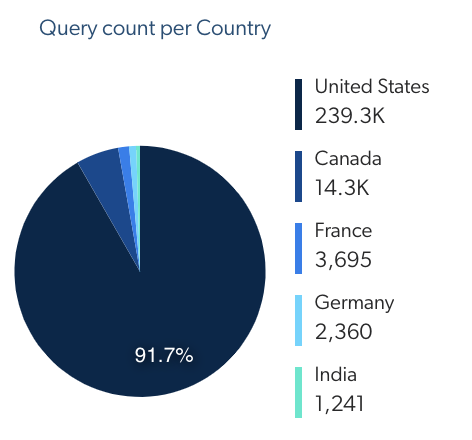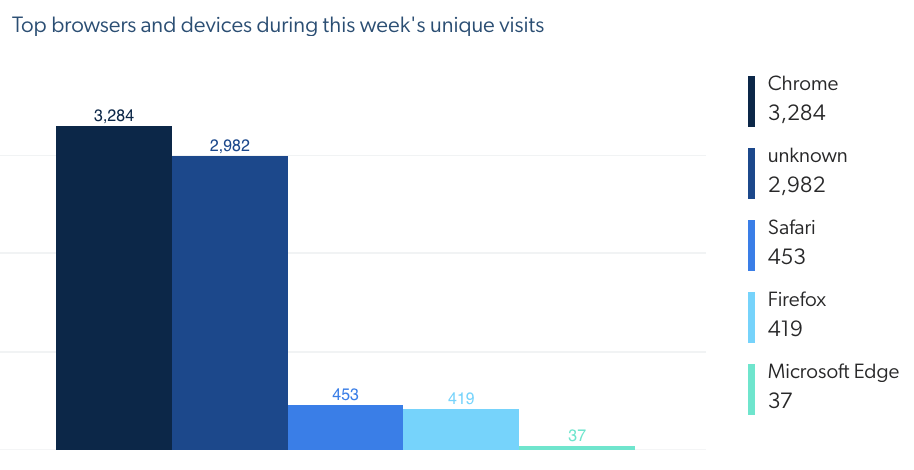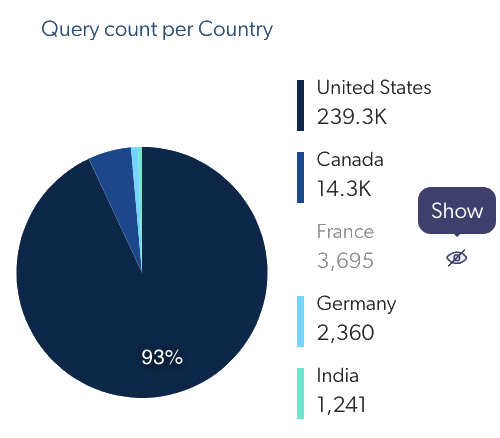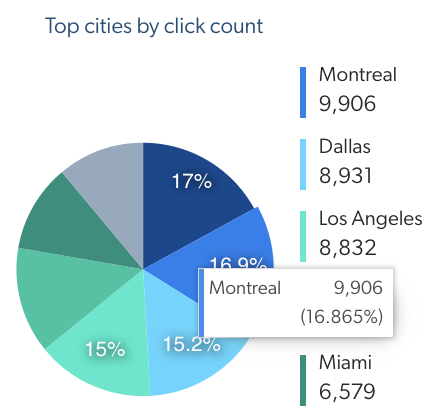Add and review pie and bar chart cards
Add and review pie and bar chart cards
Coveo Analytics dashboards offer many ways to review the data collected by Coveo Analytics. You can add pie or bar chart cards to dashboards to illustrate the most and least recurrent dimension values, such as the top browsers and devices over a period of time based on the Visit Count metric.
Add pie and bar chart cards to dashboards
-
In an existing dashboard, click Edit in the upper-right corner to access Edit mode.
NoteIn a new dashboard, the report is in Edit mode by default.
-
In a section, click Add card to section to access the Add a Card dialog.
You can also click
to duplicate an existing card, and then only modify what needs to be different.
-
In the Add a Card dialog:
-
Select Pie Chart or Bar Chart.
Examples-
You can create a pie chart illustrating the number of search events by country in the last week.

-
You can create a bar chart illustrating the top browsers and devices in the last week based on the Unique Visitor ID metric.

-
-
In the first input, enter a meaningful Card title.
NoteWhen you leave the box empty and save the dashboard, the card title will be [Selected Metric] per [Selected Dimension].
For example, Device Category per Unique Visitor ID, therefore,
Top Browsers & Devices During This Week’s Visit Count. -
Under Dimension and Metric, click the dropdown menu, and then select a dimension and a metric to be shown in the bar or pie chart by doing one of the following:
Note(For pie charts only) Since pie chart slices already represent percentages, metrics with percentage values such as Search Event Clickthrough (%) aren’t available.
-
Click the links (Search, Click, and Custom) to browse dimensions and metrics by event category, and then select the ones of your choice.
NoteCustom data can only be leveraged when using the UA Protocol. If your Coveo implementation uses the Event Protocol, custom dimensions and metrics shouldn’t be added to a report since they won’t function as expected.
-
Click All, and then use the Filter box to find and select the dimensions and metrics of your choice.
-
-
(Optional) In the Advanced Settings section:
-
Click
, and then create one or more dimension and/or metric filters.
-
In the Value destination link and Header destination link boxes, set destination links when clicking table values or titles.
-
(For pie charts only) Decide the Metric display on the chart by selecting to Display value (text or number), Display percent that represents each metric value on the sum of all values, or Display both.
-
(For pie charts only) Under Display as, select the pie chart to be displayed as a Pie or a Donut.
-
(For bar charts only) Under Display as, select the chart to be displayed with Vertical or Horizontal bars.
-
When you report on a custom event and on a search or click event (you added a filter or selected a dimension or metric related) at the same time, or on an all event category metric or dimension (for example, Unique User IP and Browser), choose to Create a relation using the Last search or the Visit between the event categories.
Select Last search in situations where the last query performed by the user is the reason for the custom event.
For example, in Salesforce, when agents attached a result to a case (
caseAttach), the last query they made gave them the results they used to do the custom event.On the other hand, select Visit in situations where none of the queries performed by the user during the visit resolved their matter.
For example, when one of your clients creates a case (
caseCreate), they, more often than not, tried to get the information they needed by querying on the subject of their matter before doing the custom event. You can then use these queries to create knowledge base articles and therefore fill the content gap.Notes-
The Create a relation using parameter has no effect when you report only on search and click events.
-
Last search links each custom event to the query immediately preceding (if any) and Visit links each custom event to all queries performed during the user visit in which the custom event happened.
-
-
-
Click Add Card.
-
-
Back on the dashboard, click Save in the upper-right corner.
Review pie and bar chart content
-
On the Reports (platform-ca | platform-eu | platform-au) page, click the report containing the packed bubble chart cards you want to review, and then click Open in the Action bar.
-
For every pie and bar charts, you can:
-
Add or remove a dimension value from the pie/bar chart by hovering over a value in the chart legend, and then click Hide/Show.

-
See the metric count for each dimension value and the percentage that this count represents on the metric total count by hovering over a part of the pie/bar chart.

-
Required privileges
The following table indicates the required privileges to view and edit dashboards from the Reports (platform-ca | platform-eu | platform-au) page and associated panels (see Manage privileges and Privilege reference).
Access to dashboards or part of their content may be further restricted as a function of the member (see Manage access to reports and Manage permission filters).
| Action | Service - Domain | Required access level |
|---|---|---|
View dashboards |
Analytics - Analytics data |
View |
Edit dashboards |
Analytics - Analytics data |
View |
Analytics - Reports |
Edit |
|
Analytics - Administrate |
Allowed |